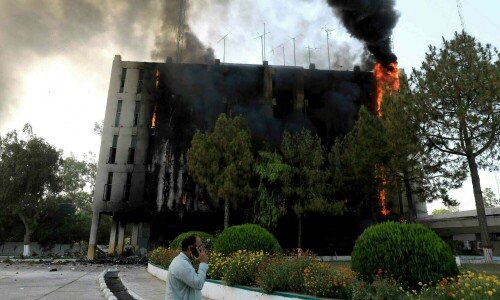ISLAMABAD: Some 173 million people in Pakistan are exposed to medium and high levels of poor air quality due to sand and dust storms, show a United Nations study.
According to the “Sand and Dust Storm Risk Assessment in Asia and the Pacific”, Pakistan is the second country in the region where population is exposed to poor air quality.
More than 500m people in India are exposed to poor air quality, 62m in Iran and 40m in China.
In proportion terms, more than 80 per cent of the entire populations of Turkmenistan, Pakistan, Uzbekistan and Iran are exposed to medium and high levels of poor air quality due to sand and dust storms, says the study released by the UN Economic and Social Commission for Asia and the Pacific (UN-ESCAP) on Thursday.
The impact of sand and dust storms on the generation of electricity by solar power plants in Pakistan, measured in economic terms, has been estimated to be $37 million per year. The greater loss in India is $107m and $46m in China.
Study says deposition of dust on glaciers induces a warming effect, including an increase in ice melting
The risk to electricity generation posed by sand and storms is likely to become greater as governments strive to ensure access to affordable, reliable, sustainable and modern energy for all, the study notes.
In the aviation sector, the exposure of aircraft engines to dust particles is a considerable risk on flight paths traversing southwestern and central parts of Asia. Flights to and from airports on the Arabian Peninsula, Pakistan, India, and China are most affected.
The risk of a flight delay, diversion and cancellation due to low visibility caused by sand and dust in the atmosphere at ground level is greatest at airports in Central Asia, southern parts of Iran, the border area between Pakistan and India, and northern parts of China.
Large areas of farmland are affected by dust deposition in Turkmenistan (71 per cent of the cropland area), Pakistan (49pc) and Uzbekistan (44pc). Much of this dust is characterised by a high salt content, which typically makes the dust toxic to plants. This reduces yields, representing a significant threat to the production of cotton and other crops, the study states.
Very high dust deposition occurs in the Himalaya-Hindu Kush Mountain range and the Tibetan Plateau, the so-called Third Pole which provides fresh water to more than 1.3 billion people in Asia. The deposition of dust on glaciers induces a warming effect, increasing the melting of ice, with direct and indirect impacts on society through numerous issues, including food security, energy production, agriculture, water stress and flood regimes.
Cities in southwestern parts of Asia have the highest exposure to sand and dust storms, which make a significant contribution to poor air quality in Karachi, Lahore and Delhi, where nearly 60m people experienced more than 170 dusty days a year in 2019.
Published in Dawn, August 28th, 2021
















































